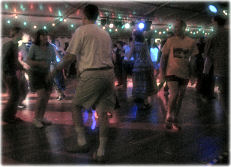Dance Music
Our dance music draws upon the huge, though often sadly neglected, English dance-music tradition, in the style that has come to be known as "English Ceilidh".

So what's a ceilidh?
One answer is "something you've probably been to without realising it".
Not so many years ago the kind of dancing and music we're talking about was often called a "barn dance", or "country dance", or "folk dance" - or even a "hoe down". The catch is that all those different names eventually got to mean different things to different people ( sometimes very different things indeed).
So many of the musicians and dancers who enjoy the fun, participatory and straightforward dances that have their roots in dances once popular across England borrowed the word "ceilidh" from our Celtic neighbours, and created the term "English ceilidh".
If you're Scots or Irish, "ceilidh" originally meant a kind of house-party, with the party-goers themselves providing music, songs and stories and maybe with a bit of dancing. An English ceilidh, by contrast, is usually based around a night of dancing, with a big emphasis on participation. The dances themselves are generally simpler (and therefore easier to understand and learn) than many Irish or American set-dances, which can be extremely complicated and something of a challenge even to experienced dancers. So "English ceilidh" means straightforward dances that are quick to learn, fun to do and can be enjoyed by all ages.
As for music, the icing on the cake is a live band that understands that this dancing is all about moving across the floor, and that it needs music that makes people want to dance and lifts them off the ground, not a smooth, heavy, or plodding beat that nails their feet to the floor! We play music that comes mostly from England, which suits the dances far better than super-fast Irish or American reels (although we do play fast when we need to, and the occasional Irish, Scots, American or Canadian tune does find its way into our repertoire).
Finally, you need someone, called a "caller" to explain the dances - and it's important to get the right caller for your event. For more information see our section on Callers.
How do you pronounce "ceilidh"? With apologies to the Scots and Irish, in England we usually pronounce ceilidh as kay-lee.
